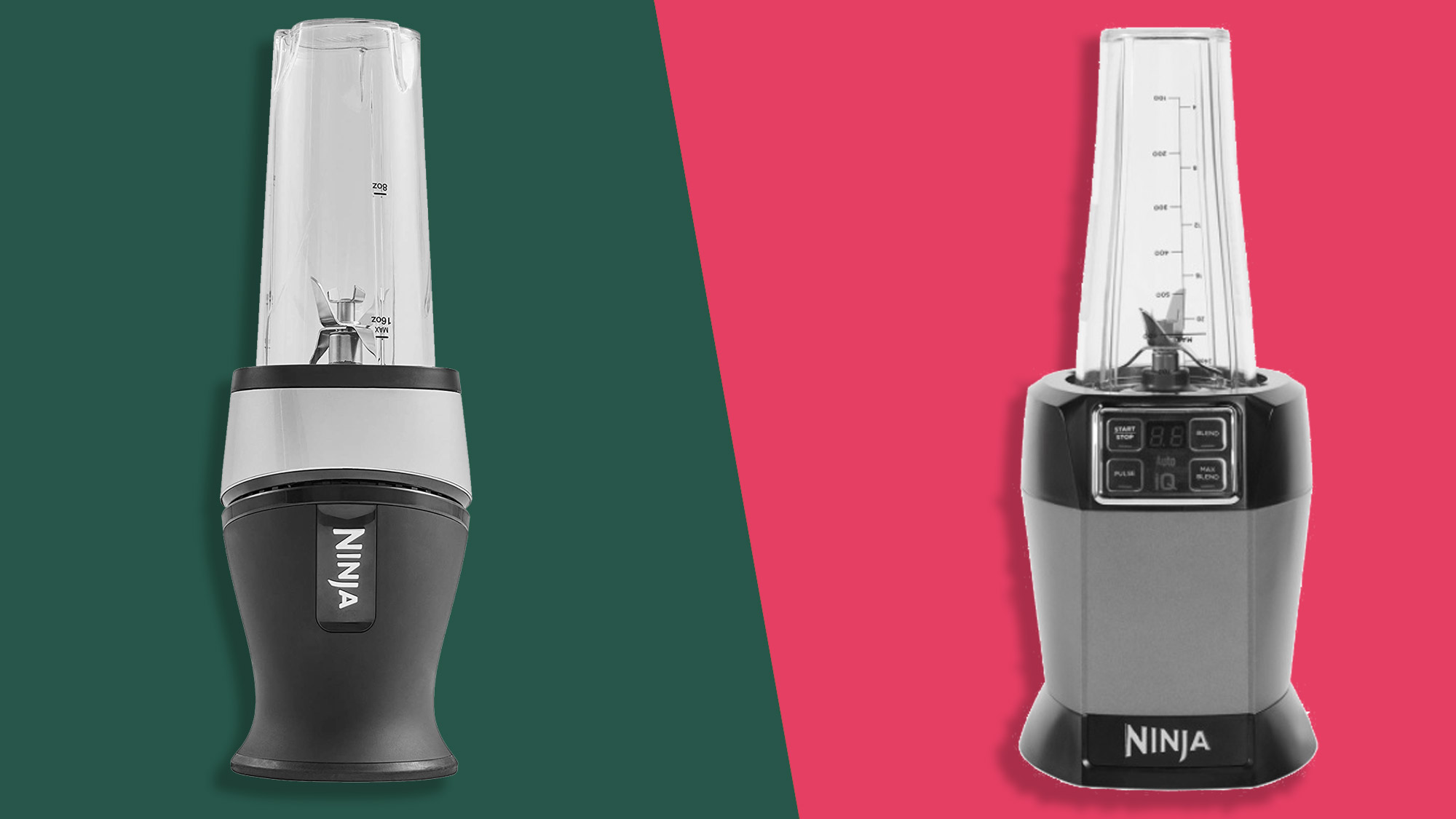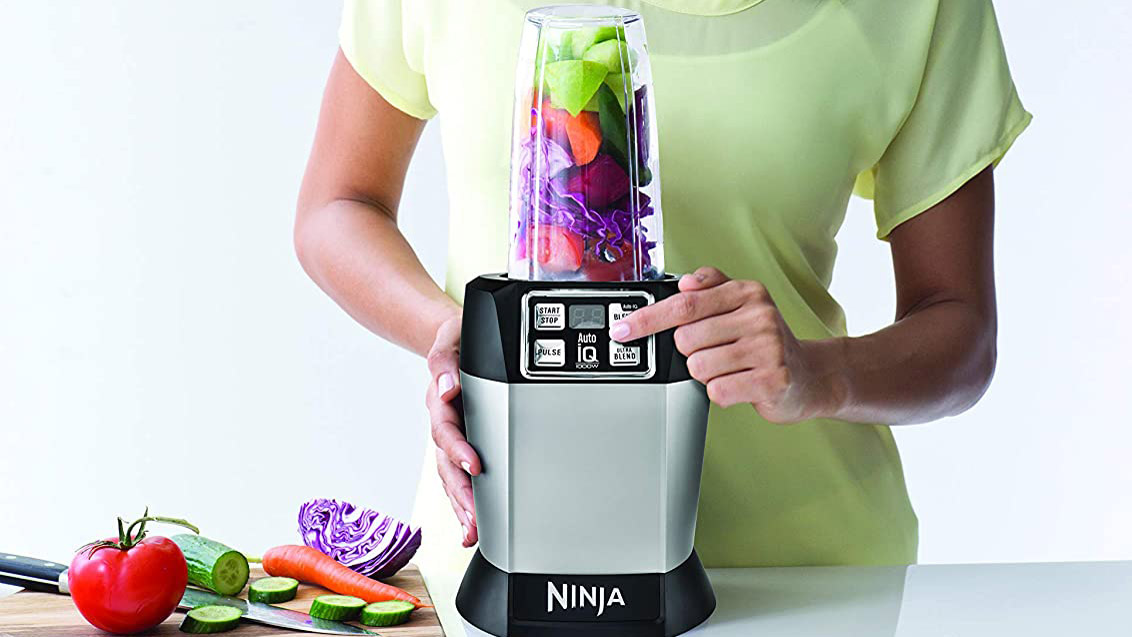Blitzing battle: can you spend less and still get a brilliant blender on Black Friday?
Is the Nutri Ninja Auto-iQ a better personal blender than the Ninja QB3001?

If you want to make smoothies but don’t want to spend an inordinate amount of money, then we’ve tested two of our top performers next to each other to find out whether you need to spend more to get a great, grit-free drink.
Over half of us enjoyed a smoothie last year (and that number is set to increase in the near future), so the best blenders are becoming something many are looking to buy, and smoothie makers, also known as portable blenders, are one of the most affordable styles of blender on the market right now, with easy assembly and ready-to-go cups that mean you can blitz ingredients and run out of the door.
With Black Friday and Cyber Monday just around the corner, and data showing blenders were one of the top three most-searched-for appliances over Black Friday weekend last year, we’re helping you make your choice.
We pitted the budget-but-no-frills Nutri Ninja QB3001 against the top-of-the-range Ninja Blender with Auto-IQ BN495 to see if spending nearly double the amount is worth it, so you can pick through the best Black Friday Ninja blender with supreme confidence.
Best Nutri Ninja QB3001 and Nutri Ninja Auto-iQ BL480D deals
Read on to find out just how these personal blenders compare – or, if you know which Ninja appliance you want, check out the best prices right now for both products below:
Price
Let’s set the scene again: the Nutri Ninja QB3001 is the brand’s most affordable personal blender, setting you back $69.99 / £59.99, while the Nutri Ninja Auto-iQ BL480D is the brand’s top-of-range personal smoothie maker and is priced at $89.99 / £99.99 (although is seeing some good early Black Friday deals). Neither model is available in Australia, unfortunately.
As personal blenders go, the Ninja models are slightly more affordable than designs from rival Nutribullet, where that brand’s entry-level smoothie maker is priced at $79.99 / £69.99 / AU$89.95, while the Nutribullet Pro 900 will set you back $109.99 / £99.99 /AU$99.95.
Get daily insight, inspiration and deals in your inbox
Sign up for breaking news, reviews, opinion, top tech deals, and more.

Design
While the Nutri Ninja QB3001 and the Nutri Ninja Auto-iQ BL480D are both personal blenders, it’s in the appearance that they differ the most.
The Nutri Ninja QB3001 has no control buttons on the front of the appliance, creating a sleek look. Instead to start the blades spinning, just push down on the container once it has been placed on the base, and release it to stop the blades.
However, the Nutri Ninja Auto-iQ BL480D uses four buttons, found on the front of the smoothie maker, to control blending as well as activate two presets that run for a predefined duration to help you take the guesswork out of blending - hence the Auto-IQ moniker.
The Nutri Ninja QB3001 has a slimmer curved base measuring 4 inches / 10 cm wide, while the Nutri Ninja Auto-iQ BL480D is wider at 6.7 inches / 17cm with a more angular design - it’s sleek vs functional, in terms of aesthetic, although neither looks out of place in a well-designed kitchen.
Both personal blenders come with two to-go containers, although those included with the Nutri Ninja QB3001 have a 16 fl oz / 470 ml capacity while the Nutri Ninja Auto-iQ BL480D containers can hold up to 24 fl oz / 700 ml each. They’re dishwasher safe and you get the same plastic spout lids with both smoothie makers.
The Nutri Ninja QB3001 has a 700w motor that spins at 18,000 RPM, while the Nutri Ninja Auto-iQ BL480D is fitted with a 1000w motor that has a 21,000 RPM, which makes it slightly more powerful. However, the same screw-on blade assembly is the same on both blenders.

Features
Both the Nutri Ninja QB3001 and the Nutri Ninja Auto-iQ BL480D offer the ability to blend a range of different items, including fruit and vegetables as well as nuts and ice.
They work in pretty much the same way too. Just add the ingredients to the container and screw on the blade assembly.
Turn it upside down and place it on the base. However, the two appliances differ slightly when it comes to starting and stopping the blades.
With the Nutri Ninja QB3001 you simply need to invert the container once the blade assembly has been attached and press down on the container to begin blending. However, the Nutri Ninja Auto-iQ BL480D must be locked into place after it's been placed on the base, otherwise, the blades won’t activate when the buttons are pressed.
As we’ve already mentioned, the BL480D has a manual start/stop button to control the blades, as well as a pulse feature that lets you spin the blades in short bursts.
There’s also a Blend program, which runs for 50 seconds and, according to Ninja, is good for drinks with fresh or frozen fruit, liquids, and ice, alongside a 60-second Max Blend setting, for tough ingredients such as skins, seeds, and stems.
On test, we found both blenders pulverized leafy spinach and fibrous pineapple together with a range of other smoothie ingredients including banana and greek yogurt to create a nicely aerated, grit-free smoothie. Both blenders also evenly crushed ice and nuts too.
Even though the BL408D has a more powerful motor that spins faster, the QB3001 was just as efficient at blitzing fresh produce, however, it took ever so slightly longer at 45 seconds, compared to the 35 seconds the BL480D took.
Verdict
When it comes to choosing between the Nutri Ninja QB3001 and the Nutri Ninja Auto-iQ BL480D, as both smoothie makers were able to create smooth refreshing drinks from even tough, fibrous fruit, the QB3001 is the clear choice as it's slightly cheaper and only takes a few seconds longer.
However, if you want to blend larger quantities, or you prefer presets so you take a ‘set it and forget it’ approach to blending, then BL480D may be a better choice.
- Prefer coffee to smoothies? Check out the latest Black Friday coffee machine deals
Carrie-Ann Skinner was formerly Homes Editor at TechRadar, and has more than two decades of experience in both online and print journalism, with 13 years of that spent covering all-things tech. Carrie specializes in smart home devices such as smart plugs and smart lights, as well as large and small appliances including vacuum cleaners, air fryers, stand mixers, and coffee machines. Carrie is now a copy editor at PWC.
